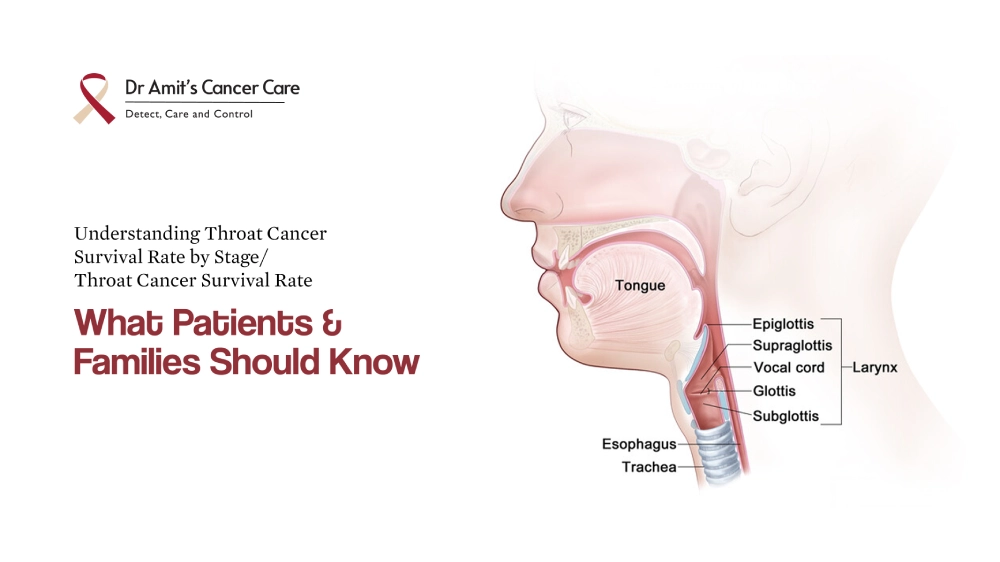Overview
Cancer, in terms of biology, is nothing more than a collection of sick cells that divide at a much faster rate than the usual rate.
A tumor of this kind forms spontaneously, displacing healthy cells, and spreads fast throughout the body.
Cancer cells have the potential to “spread” from the tumor to other sections of the body or organs. It has the potential to result in creating another tumor (metastases).
The immune system does not recognize the cancer cells as aberrant, and as a result, the immune system does not take any action against them.
How to Detect Throat Cancer?
Your Throat Cancer Surgeon may offer the following tests to identify throat cancer:
- Using a scope to get a closer look at your throat: Endoscopy is a procedure in which a doctor examines your throat using a special lit scope (endoscope) to understand better what is going on. To detect abnormalities in your throat, doctors use a television screen to watch the endoscope’s camera for abnormalities.
With voice box, laryngoscopes are scopes that are utilized to inspect it. For example, your expert throat doctor may use this magnifying lens to examine the chords of your voice. This procedure is referred to as laryngoscopy in the medical community.
- Removing a tissue sample for testing: After an endoscopy or laryngoscopy has been performed and abnormalities found, surgical equipment may be passed via the scope to retrieve tissue samples (biopsy). The sample is delivered to a laboratory to be tested.
Pathologists (doctors who have had specialized training) will look for signs of malignancy in the laboratory. In addition, because the HPV virus impacts treatment options for certain types of throat cancer, we may also test the tissue sample for the virus.
- Imaging tests: Imaging treatments such as CT scans, magnetic resonance imaging (MRI), and PET scans may be performed to help your throat surgeon better assess the amount of cancer that has progressed beyond the neck or voice box.
How to know if I have throat cancer?
Throat cancer symptoms, which include difficulty swallowing, speaking, or breathing, may affect the mouth, nose, sinuses, and throat. Here are some warning indicators to keep an eye out for:
- A persistent cough
- Changes in voice, such as a hoarseness
- Inability to communicate
- A swollen throat.
- Clearing your throat regularly.
- Inability to eat or drink
- Your neck may be swollen with lymph nodes or a tumor.
- Ringing in the ears, or pain in the ears
- Frequent nosebleeds
- An unexplained drop in weight
Also, Read- Is Throat Cancer Curable
What Can I Do To Protect Myself?
There is currently no known method of preventing throat cancer from developing. However, there are things you can do to lower your chance of throat cancer, such as
- Stop smoking or don’t start smoking: If you smoke, you should stop. If you don’t currently smoke, don’t begin. Getting rid of a smoking habit may be very tough, so seek help. Several stop-smoking techniques, such as medication, nicotine replacement products, and counseling, may be discussed with your doctor to determine the advantages and dangers involved.
- If you consume alcohol, do it in moderation or not: If you decide to consume alcoholic beverages, do so in moderation. Drinking up to one drink per day for women and up to two drinks per day for men is healthy for adults.
- Choose a nutritious diet rich in fruits and vegetables: Increased consumption of fruits and vegetables, including vitamins and antioxidants, may lower your risk of throat cancer. Consume a range of brightly coloured fruits and vegetables.
- Protect yourself from HPV: A sexually transmitted infection known as the human papillomavirus is suspected of being the cause of certain throat malignancies (HPV). Limiting the number of sexual partners you have and wearing a condom every time you have sex may lower your chance of contracting HPV. Examine the possibility of receiving the HPV vaccination, which may reduce the risk of throat cancer and other HPV-associated malignancies.
Conclusion
There are many distinct forms of throat cancer, each with a varied prognosis and treatment options. In most situations, receiving a timely diagnosis increases one’s chances of survival.
Preventing or stopping smoking, restricting alcohol intake, and seeking medical advice on the HPV vaccine are effective approaches to lower the risk. It is critical to be aware of any potential symptoms and get medical attention if they occur.






